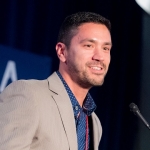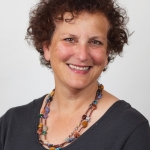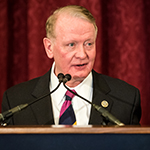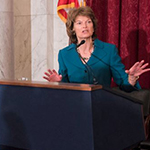arts advocacy day

Mr. Robert Lynch
The Battle Wages On for the Arts
Posted by Apr 18, 2018

Mr. Robert Lynch
Our field collectively high-fived recently when Congress passed the long-delayed budget for fiscal year 2018. Together we beat back the Trump Administration’s proposals to terminate the National Endowment for the Arts and National Endowment for the Humanities, funded now through September 30. Each will receive a total of $152.8 million, $3 million more a piece than last year. Congresswoman Louise Slaughter, who passed away last month, was a fierce champion for the arts for decades, and this win is a very fitting tribute to her longtime leadership. It took the unified, tireless, and persistent work of the arts community and grassroots advocates nationwide to achieve this win. Strong activism resulted in a powerful bipartisan message that arts and humanities funding strengthens and enriches our communities and grows local economies.
Read More
Mr. Robert Lynch
Remembering Louise (1929 – 2018)
Posted by Apr 18, 2018

Mr. Robert Lynch
On March 16, 2018, a dear friend, tireless advocate, and arts leader passed away, U.S. Representative Louise M. Slaughter. I have known Louise for 32 years. We’ve partnered in nearly that many Arts Advocacy Days. It has always been my honor to stand with Louise. I’ve stood with her on over 100 occasions in the last 23 years while she co-chaired the Congressional Arts Caucus. Americans for the Arts and the nation’s arts community owe a debt of gratitude to Louise Slaughter. There has never been an arts advocate with more tenacity, fight, humor, and spirit of generosity. May she rest in peace knowing that she made the world a better place through the arts, and may her trailblazing pave the way to more arts leaders recognizing the transformational power of the arts on our lives, communities, economy, and nation.
Read More
Mr. Robert Lynch
Eight for 2018: New Obstacles and Opportunities in the Arts
Posted by Mar 08, 2018

Mr. Robert Lynch
Over the first quarter of 2018 I’ve had the great opportunity to spend time listening to the wisdom of my colleagues in the field. From these gatherings, I continue to see first-hand the spectacular array of work and service offered by the non-profit arts community in our country. It is a vibrant, effective, optimistic, inciteful, and growing field that uplifts our communities across the country. Despite challenges in funding and support, the creativity of our arts field surges forward. There are new benchmarks to celebrate and new obstacles to overcome, all leading I hope to new opportunities for the arts. Here are eight observations for 2018.
Read More
Julia Kirt
Understanding, Connecting, and Seeking the Common Good
Posted by Feb 20, 2018

Julia Kirt
Talking with voters, framing issues, raising money. What’s happening to me and how can it feel so natural? For the past 20+ years I’ve been an arts administrator. For the past three, I’ve led our state’s arts advocacy organization, Oklahomans for the Arts. Now, I am running for State Senate in Oklahoma’s District 30. We focus so much attention on elected officials in arts advocacy. Now I’m striving to become one and it feels like just the right conclusion. I felt pushed off the sidelines into running for office from my experiences advocating for arts and education. We’ve led the nation in state cuts to education, and arts funding has been cut almost 50% in the past eight years. Marking this more-than-year-long marathon transition, here are some ways I’m finding that advocacy compares to and differs from running for office.
Read More
Shannon McDermott
Art in Politics: Why Both Matter
Posted by Feb 22, 2018

Shannon McDermott
Every day at work, I am reminded that the intersection between art and government continues grow in importance. Funding, allocation, and government spending is essential to developing our education system. I intern for Americans for the Arts because advocating for equitable access to art and arts education vastly improves our education system. Research shows that marginalized communities consistently have little to no access to arts education in schools. Some of the most diverse voices are being shut out of conversations and art creation. We are left with an education system that refuses to elevate some of the most integral voices in diversity for our dialogue and our art. I had the privilege of art shaping my entire childhood, but there are some places youth have no access to art at all due to systemic inequality in our education system.
Read More
Mr. Joshua Jenkins
Maggie and Melvin—Generations of Advocacy
Posted by Feb 15, 2018

Mr. Joshua Jenkins
Sitting down for a documentary interview the day before the unveiling of a monument to Maggie L. Walker in Richmond, community leader Melvin Jones Jr. was bubbling with joy in anticipation of seeing a project he had fought so tirelessly for finally come to fruition. A humble man in his early sixties, Jones felt familial to me. Never taking too much credit for accomplishments and always speaking with a smile, he wore his passion on his sleeve for all to see and had an arsenal of Maggie L. Walker wisdom that could supersede any textbook. His energy was contagious and he carried a binder full of documents he had collected. What I assumed would be a nuts and bolts interview about process turned into a conversation around history, legacy, and the diligence of a man who would go from a concerned citizen with an idea to public art proponent over the course of a decade.
Read More
Brandon Gryde
Strength in Numbers
Posted by Feb 06, 2018

Brandon Gryde
In advocacy, there’s enormous value in the large numbers of voices coming together, unified around an issue. Arts Advocacy Day brings together more than 500 individuals who are passionate about the policies that support artists and audiences in their communities. Those who visit Washington, DC each spring roam the halls of Congress, meet with Congressional members or their staff, and follow up with thank you letters and stories. We bombard lawmakers with a lot of information, facts, and anecdotes, bringing a wave of enthusiasm for pro-arts policy-making. But what happens throughout the rest of the year in DC?
Read More
Estee Dechtman
Step into the Fear
Posted by Feb 08, 2018

Estee Dechtman
Above the door of my theatre teacher’s classroom is the saying, “Step into the fear.” This saying has become a motivation of mine during this turbulent environment where support for arts education is more important than ever before. As a theatre student, history and human behavior jump off the page and come alive, forming an ensemble of different perspectives from a wide range of characters. These characters help me better understand the evolving world in which I live and inspire me to make a difference. Theatre has taught me to speak up, and this skill is not lost on me as an advocate. As I learn more and more about the world through plays, art, and music, I find myself with a greater efficacy and understanding of the value of arts advocacy.
Read More
Ms. Kate O. McClanahan
Arts Advocacy Day Is Coming
Posted by Feb 01, 2018

Ms. Kate O. McClanahan
Although years may really just be a number, in its 31 years, Arts Advocacy Day has seen six different U.S. presidents spanning both political parties. It’s witnessed sixteen different congressional sessions and eight different Speakers of the U.S. House. Through it all, every year, attendees hear that “the arts are bipARTtisan.” Because, no matter who’s in office, arts advocacy matters. Funding decisions are made every year. Who’s deciding this year may not be deciding next year. Who’s to remember what happened before? Who’s to know why it matters? Who’s to learn from each other? The answer is us. All of us. All of us together.
Read More
Jonathan Estabrooks
Artists For The Arts: How One Voice Became a Movement
Posted by Mar 14, 2017

Jonathan Estabrooks
It was January 19, 2017, and news had just broken that the National Endowment for the Arts (NEA) and Humanities (NEH) could soon be at risk of elimination. As an opera singer and creative entrepreneur, I knew how crucial arts funding was for society at large. Inaction was not an option, so that night I turned to change.org and created a petition to save the NEA. I’m not sure what I hoped would come of it, but I knew that this was an issue near and dear to my heart, and perhaps, if enough everyday Americans realized what was at stake, the community could have a fighting chance.
Read More
Grace Alt
Empowering and Inspiring Student Voices
Posted by Mar 10, 2017

Grace Alt
As a senior in high school, I will be attending my third National Arts Advocacy Day this year. For many students, the words “arts advocacy” make us feel small. Upon hearing that phrase three years ago, it sounded like something I was not old enough to know about. How can my voice matter in changing things so far above my power as a teenager? In school, we are taught to get the best education possible to become someone who can affect change, but often we aren’t told that, as kids, our opinions matter. When policy makers shape decisions about arts education, they are making decisions about us, the students. Yet for some reason, it is the students who feel as though they are out of place in a Senator’s office.
Read More
Jerelle Jenkins
The Significance of Arts Advocacy: A Graduate Student Perspective
Posted by Feb 24, 2017

Jerelle Jenkins
W.E.B. DuBois once said that we should “begin with art, because art tries to take us outside ourselves. It is a matter of trying to create an atmosphere and context, so conversation can flow black and forth and we can be influenced by each other.” As I read this quote during the final stretch of my undergrad years at Saint Louis University, I had just became an art history minor. Though I held a deep admiration for visual arts as well as the critical analysis of the work, I had absolutely no idea where I would end up with a liberal arts degree. It was not until I was perusing the internet that I was drawn to American University’s Arts Management program. Now, a little over a year later, I have been fortunate enough to not only be a full-time student of the Arts Management program but also the Government and Public Affairs intern at Americans for the Arts.
Read More
John Schratwieser
A State Captain’s Final Log: The Future is in Our Very Creative Hands
Posted by Feb 28, 2017

John Schratwieser
One of my first trips as Director of Maryland Citizens for the Arts (MCA) was to the small, western Maryland industrial-town of Cumberland. Known as “Queen City,” Cumberland was Maryland’s second largest city in the 19th century thanks to the three R’s: roads, rails, and rivers. Arriving, one might expect to see a typical forgotten rust-belt town. Well, not this town! Cumberland became an Arts & Entertainment District in 2002, one of Maryland’s first. The management team targeted artists looking for affordable space and great proximity to major markets. The downtown felt as vibrant as any I’d seen, and there was a provincial feeling in the air—in the best sense of the word.
Read More
Ms. Najean Lee
There’s No “I” in “Arts Advocacy”
Posted by Mar 03, 2017

Ms. Najean Lee
While a presidential election season is the most intense time of political engagement for most citizens, advocates who dedicate themselves to a particular issue or set of issues know that there is seldom a defined starting or stopping point to our work. This is especially true for the arts, which encompass a wide range of policies in addition to federal funding (for example, improving the visa process for foreign guest artists to perform in the U.S., or protecting the ability of musicians to travel across international borders with instruments that contain protected species material). Happily, speaking up for the arts and our many policy concerns is easier to manage thanks to the work of coalitions such as the ad hoc Cultural Advocacy Group, which my organization—the League of American Orchestras—has been a part of for decades.
Read More
Eleanor Shingleton
The Importance of State Captains for Arts Advocacy Day
Posted by Apr 13, 2016

Eleanor Shingleton
There is one thing without which Arts Advocacy Day could not happen—State Arts Advocacy Captains! Though Americans for the Arts’ State Arts Advocacy Captains are instrumental in fighting for the arts year-round, their work is also integral to the success of Arts Advocacy Day each spring.
State Arts Advocacy Captains are the eyes and ears on the ground in each state nationwide, serving to recruit the best and most dedicated advocates from their state to attend Arts Advocacy Day. During the months leading up to Arts Advocacy Day, captains make sure colleagues, artists, university students, and concerned members of their states know the importance of bringing your voice to Capitol Hill to meet with your Members of Congress directly in the fight for arts and arts education.
Read More
Ms. Elisabeth Dorman
Welcome to Innovations in State Arts Advocacy Blog Salon!
Posted by Apr 11, 2016

Ms. Elisabeth Dorman
Who are the players in statewide arts advocacy you might ask?
Text book speaking, state arts advocacy leaders and their organizations are the primary source of advocacy promoting arts and arts education friendly policy from state governments. Many statewide arts advocacy leaders belong to Americans for the Arts’ State Arts Action Network (SAAN), so you may also hear them referred to as SAAN members.
Read More
Ms. Kate O. McClanahan
The Four Minutes That Changed STEM to STEAM
Posted by Apr 01, 2016

Ms. Kate O. McClanahan
If you were in Washington, DC a few weeks ago, you might have participated in several events surrounding the National Arts Action Summit, now marking its 29th consecutive year of arts advocacy days on Capitol Hill.
One of those events might have been the Nancy Hanks Lecture on Arts and Public Policy, delivered by John Maeda, designer, technologist, and catalyst behind the national movement to transform STEM to STEAM. He was introduced by co-chair of the Congressional STEAM Caucus, Representative Suzanne Bonamici (D-OR).
How did this duo come together before a crowd of over 1,200 to talk about STEAM on the national stage at the John F. Kennedy Center for the Performing Arts—for a lecture about how STEAM makes STEM taste better?
Read More
Salwa F. Meghjee
Honey, I Empowered the Kids
Posted by Apr 04, 2016

Salwa F. Meghjee
As a high school student, the guideline I was given to write this blog post, “operationalizing access and equity in arts education,” sounds inaccessible within itself. I won’t lie, I had to look up what equity means (it means fairness). In my life, access to arts education is something I rarely think of as an idea; it’s something I’m accustomed to. I’ve had it for so long that I often forget that I fought for it.
Read More
Mr. Robert Lynch
The Passion of Arts Advocates Driving Change: Kennedy, U.S. Lawmakers, and You
Posted by Mar 30, 2016

Mr. Robert Lynch
Earlier this month I was in Cambridge, Massachusetts, giving a lecture on arts and public policy at the Harvard Kennedy School’s Institute of Policy. In lieu of standard hotel accommodations, I was offered the chance to stay in John F. Kennedy's senior year suite in Winthrop House—and of course I jumped at it. Sitting down at Kennedy’s desk—complete with an Underwood portable typewriter—I was profoundly moved. I thought of his inspiring words and they resonated with the event and work of the week to come, Arts Advocacy Day, when citizen advocates take to Capitol Hill to make the case for federal support for the arts and arts education.
I am certain that after the dust of centuries has passed over our cities, we, too, will be remembered not for victories or defeats in battle or in politics, but for our contribution to the human spirit.
Read More
Ms. Anne Katz
Advocacy in "Interesting" Times
Posted by Feb 11, 2016

Ms. Anne Katz
This article was originally published by CultureWork: A Periodic Broadside for Arts and Culture Workers, in January 2016. CultureWork is a publication of The Center for Community Arts and Cultural Policy at the University of Oregon. The following blog post is an abbreviated version.
The idea that advocacy should be a daily activity, and not just something that is reserved for once-a-year visits to the State Capitol, hit home for me a few years ago. An enthusiastic constituent made the trek to Madison from a small town on the Mississippi River—a trip of at least four hours each way—to attend Arts Day. At the end of the day, she told me that she had had a great time learning and networking but didn’t get a chance to visit with her legislator. She said, "I'll come back to Madison one of these days to meet with him." My response was, "Well, he'll be home this weekend, and every weekend, so why don't you just call him up and meet for coffee at a local café?" That's when I realized…there's a misconception out there that advocacy is something separate from life, that you have to make a special effort and drive a long way to meet with your legislator to be part of the civic discourse.
Read More
Ms. Kate O. McClanahan
ESEA Reauthorization – The Senate Takes Action!
Posted by Jul 06, 2015

Ms. Kate O. McClanahan
Although the timing of congressional votes keep getting kicked around, it remains a crucial time in Washington for arts education.
Anything’s possible*, but what’s most likely is a U.S. Senate floor vote and amendment consideration this week—as well as a long-delayed House floor vote—on the Elementary and Secondary Education Act (ESEA) reauthorization.
Read More
Mr. Robert Lynch
Advocating for the Arts? Tell a Story
Posted by Apr 24, 2015

Mr. Robert Lynch
As I reflect on the recent National Arts Advocacy Day and the several hundred visits to the offices of our Congressional representatives and senators that took place, I can think of hundreds of stories to tell. Each of the nearly 550 arts advocates from all fifty states, members of Congress, and artists who joined us in Washington, D.C. to advocate for the arts on Capitol Hill came with a story about how the arts have transformed them and the people around them. To many, the arts have brought hope and fortitude, been a partner in solving community problems, and provided Americans with role models, identity, and opportunity.
Read More
Ms. Kate O. McClanahan
Net Neutrality and the Arts
Posted by Mar 06, 2015

Ms. Kate O. McClanahan
Last week, the Federal Communications Commission (FCC) approved new rules for enforcing net neutrality. Independent agency rulemaking might sound like a sleepy topic, but over 4 million people – a record-setting number – sent in comments. What does the rule mean for artists and arts organizations?
First, what is “net neutrality?”
It’s the idea that your Internet Service Provider (ISP), like Verizon or Comcast, doesn't discriminate when it comes to Internet traffic—meaning throttling or blocking legal content that you want to access or share. A company also can’t pay your ISP to speed up service for certain sites.
Read More
Mr. Narric Rome
U.S. House Votes Impacting Arts Education
Posted by Feb 26, 2015

Mr. Narric Rome
Last night it was confirmed that the U.S. House of Representatives is scheduled to consider over three dozen amendments to "The Student Success Act" (HR 5), a bill to reauthorize federal education programs. This is a legislative effort last completed 13 years ago through the No Child Left Behind Act. There is a great need to improve upon that outdated legislation.
Through Friday's floor consideration in the House, members of Congress will have an opportunity to vote on HR 5 and a Democratic alternative - but both bills are expected to receive partisan vote outcomes.

Kristen Engebretsen
Introducing…"Encourage Creativity: Teach the Arts"
Posted by Feb 13, 2015

Kristen Engebretsen
Americans for the Arts (AFTA) believes that the arts are an essential part of preparing students for success in school, work, and life. We provide practical tools, advocacy resources, and research-based publications, such as our Field Guide and Navigator e-book series to help convince leaders of this important role the arts play in student success.
Because we work in the arts, one of most powerful forms of advocacy is using our art forms to communicate. Having artistic and high-quality materials, such as the Field Guide and Navigator e-books, is essential to how valuable these advocacy tools are.
Read More
Dr. Stephanie L. Milling
Student Advocates for the Arts in the College Classroom
Posted by Feb 11, 2015

Dr. Stephanie L. Milling
In my last blog, I spoke about developing future arts advocates and some of the misconceptions that might prevent individuals from participating. To continue on a similar trajectory, there is one population, in my opinion, that we should target as the next generation of arts leaders who will continue to sustain theatre, dance, creative writing, visual art, and music for many generations to come: students.
Read More
Mr. George P. McLeer, Jr.
USE US
Posted by Apr 18, 2014

Mr. George P. McLeer, Jr.
As we sat down with our Congressmen this past March during National Arts Advocacy Day, one message kept coming out of my mouth, “In my community, we don't just 'fund' the arts, we use the arts.” I didn't arrive in Washington with that phrase in my mind. I didn't even think about it until after our “advocacy sessions,” the day before we visited Capitol Hill.
What alarms me the most about our annual trek to Capitol Hill is that our ask never seems to change— “We would like our Representative/Senator to support funding the NEA/Arts Education at this specific level.” We mention the ability to leverage the arts for economic impact, improve education, and make our lives more fulfilling, but at the end of the day we ask for money—either from the federal government or private citizens via tax policy shifts.
We need to stop asking for money and instead ask for a new vantage point.
Read More
Cutting Arts Education is a Form of Identity Theft
Posted by Mar 21, 2014

The arts are powerful because they provide us with, and help us to create, our identities - who we truly are. The two ultimate questions we have in life are: who am I and why am I here? If you find the answer to the first, it will help lead you to the answer to the second. Identity provides us with a sense of meaning and purpose.
It was in art that I found my own identity. I was in sixth grade and had always really struggled in school. I was lost and confused and thought I was a failure; my self-esteem and confidence were extremely low. Back then there weren’t a lot of diagnosis like ADD, ADHD, or learning disabilities. I was diagnosed as being lazy and a troublemaker…and they probably had a pretty good case against me. Then my 6th grade teacher, Mrs. Ferguson, said four words that changed my life. We were doing an art lesson and she came up behind me, looked at my picture and said “Wow, that’s really great”! The other students gathered around and shared her enthusiasm. All of a sudden I wasn’t a failure anymore…I was an artist. I had an identity! I’ve carried that identity and confidence with me to this very day, it’s made me who I am.
Read More










